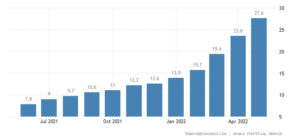Ghana’s inflation has hit a record high since beginning of the year 2022. Ghana’s annual inflation rate accelerated for the 13th consecutive month to 29.8% in June of 2022 from 27.6% in May, breaking the upper-ceiling of the central bank’s target band of 6% to 10% for ten months – and this is the highest since 2004. Records from the Ghana Statistical Service indicate that food inflation increased to 26.6% and non-food inflation increased to 21,3% as at end of April.
Brand items in the inflation basket show 295 out of 305 items recorded price increases. However, the data revealed that 99 of the items recorded a higher inflation rate than the national average inflation of 23.6%. The surge in inflation may be as a result of several factors: the recently introduced 1.5% E-levy, perennial depreciation of the cedi, increase in Bank of Ghana policy rate to 17%, continuous increases in petroleum prices, increase in demand for both imported and local food unmatched by supply.
Evidently, inflation in Ghana is really caused by fiscal expenditure and non-monetary issues. An import-driven economy like Ghana cannot consistently control inflation because the Ghanaian’s taste for foreign goods and serviced is part of the problem. Government expenditure needs retargetting to drive food distribution cost parity, supply and storage. The central bank seems to be using the monetary policy rate (19%) to mop up excess liquidity and cash from the economy, which unfortunately has failed.
| Data Highlights
Calendar |
GMT | Reference | Actual | Previous | Consensus | TEForecast | |
| 2022-06-08 | 10:00 AM | May | 27.6% | 23.6% | |||
| 2022-07-13 | 10:10 AM | Jun | 29.8% | 27.6% | 29% | ||
| 2022-08-10 | 10:00 AM | Jul | 29.8% | ||||
Reasons for the Sharp Surge in Inflation
A national workforce of about 45% directly or indirectly employed in the agriculture sector makes it a key contributor to growth of the economy. However, farming, poultry, fisheries and forestry are in decline due to lack of mechanisation and access to finance for smallholder farmers, causing local food prices to increase across the country.
It is very surprising that with the introduction of several farmer-friendly agriculture policies by the Ghana government, food prices continue to see very fast-paced increases in price, making the cost of living very high. In fact, it is the case that what policymakers say is quite different from the impact these inflationary conditions have on the people.
Frequent increases in petroleum prices is one of the reasons inflation is surging. Farmers across the country are having higher yields/harvest; however, they are unable to transport all their produce to marketplaces because the cost of transportation is very high.
Deteriorating rural roads, especially in the farming areas, is another reason why foodstuffs do not get to the towns and cities where they are needed most. Torrential rains in the past 2 to 3 months and the resultant flooding have rendered a lot of roads in the hinterland unmotorable. All these adverse factors caused a surge in the price of produce and the resultant rise in rate of inflation.
The impact on their produce from lack of artificial fertilisers for farmer cannot be underestimated, especially its impact on food prices. By some estimates, close to 80% of local smallholder farmers could not afford local fertiliser even with government subsidies. The problem with fertiliser is the fact it is usually imported, and tcontinuous depreciation of the Ghanaian cedi against the dollar – by some 17% since the start of 2022 – compounds the problem with inadequate supplies. On the other hand, smallholder farmers are not equipped with the right technological inputs and techniques of modern-day farming to increase crop cultivation and yields.
In marketing farm produce, it is very evident that most Ghanaians are used to buying foodstuffs in the open marketplace. So when these foodstuff cannot get to consumers in the cities because of high transport cost, bad road network, lack of storage facilities – and sometimes lack of cargo vehicles, they end up either being destroyed or sold at a discount.
The current economic situation in Ghana can be solved through a revamp of the agricultural sector. Agriculture is undoubtedly the most important sector in our economy and employs almost 60% of our citizens. However, budget allocation and government expenditure does not reflect this in the sector.
Moreover, government’s initiative of Planting for Food and Jobs (US$641m expenditure) has not significantly impacted the agricultural sector so foodstuff are made affordable for the average citizen, as compared to the Operation Feed Yourself (OFY) flagship government programme of the 1970s.
Recommendations
- Government policy initiative on Planting for Food and Jobs should be reviewed to make farming/fishing very attractive and lucrative for all Ghanaians.
- Government should invest into mobile storage trucks for transporting farm produce from rural areas to the cities where they are needed most.
- Government should invest into storage facilities at major market centres to store and preserve farm produce for market women.
- Government should invest in rural farm roads to connect market districts across the country.
- Promote the involvement of farmers and fishermen in policy design, planning, implementation and monitoring; and the assessment of its impact on their output and living standards.
The writer is a Financial & Economic expert who believes that ordinary people can do extraordinary things when given opportunity. Email; [email protected]/0541238987











